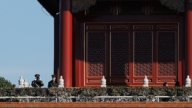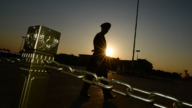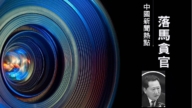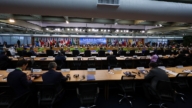【新唐人2012年7月23日訊】近年來,中共與日本、越南、菲律賓等國,為爭奪海洋主權,摩擦不斷,一度劍拔弩張。另一方面,中共內部最高權力的交替與角逐也日趨白熱化,在此之前曾有傳言,今年中共18大之後,胡錦濤將留任軍委主席至少兩年。最近香港媒體報導認為,當前中國大陸和周邊國家的緊張局勢,為胡錦濤留任軍委主席增加了理由。
香港《明報》指出,目前南海和中日釣魚島的局勢都十分緊張,擦槍走火的機會很大,大陸中央軍委的壓力加大。這使得胡錦濤有更大的理由,在卸任中共總書記和國家主席職位後,繼續擔任中央軍委主席。
對此,《北京之春》雜誌主編胡平向《新唐人》表示,中共在這些衝突上只是製造聲勢而已,並不會真正動武,所以這件事情與胡錦濤留任軍委主席沒有太大關係。但如果真的爆發軍事衝突,確實會強化軍委主席對軍隊的掌控。
胡平:「你現在有機會能夠以軍委主席的名義發號施令,這麼一來,就好像是比較名符其實了。所以如果在南海上,中共軍隊要有所動作的話,當然對胡錦濤是有利的。」
今年4月,重慶前市委書記薄熙來被解職的同時,捲入薄熙來、周永康「政變」醜聞的中共國防部長梁光烈到南方調研,要求把邊海防擺在重要位置,「在重大任務中當尖兵」。同一時期,南海衝突爆發。 4月8號,菲律賓海軍軍艦將中國漁船堵在黃岩島,並登船檢查﹔4月10號中國海監船趕赴爭議海域,中菲對峙發生。
《新紀元》週刊指出,梁光烈原本想通過南海黃岩島危機,以「黨內團結、一致對外」的名義保下週永康甚至是薄熙來,但受到胡錦濤的警告後,梁光烈態度軟化,聲稱:「軍方行動要根據國家外交需要。」
6月下旬,同樣曾經是中共盟友的越南,將西沙群島和南沙群島納入主權和管轄範圍。大陸民政部則宣佈設立三沙市,管理西沙、南沙及中沙群島,由此引發了越南國內連續的反華遊行。
胡平:「我想在南海問題上,中國(中共)的處境比較為難。因為它(中共)知道,原來中國自己單方面宣佈的甚麼『九段線』那個界線,是並沒有得到國際公認的。」
胡平指出,中共政府很清楚這一點,但又不願意和其他國家坐下來商談,所以就採取迴避的態度,只是籠統的說「共同開發」或者「擱置爭議」。
另外,中日之間關於釣魚島主權的長期衝突,最近也日益升級。
胡平:「日本當然國力、軍事力量,比南海那些國家要強大得多,所以這麼一來,它(中共)就陷在好幾個問題中間。我想,中共到目前為止,它也就是口頭上嚷嚷,真正要採取軍事行動,我覺得可能性還是非常之低。」
據了解,釣魚島諸島共由5個小島組成。 1932年,日本政府將其中4島賣給私人,現在的島主是栗原家族。 《BBC》中文網報導,繼日本東京都今年4月宣佈為保護領土而準備購買這4個島嶼之後,日本政府也開始與島主聯繫,商談購買事宜,因而引發中方抗議。
採訪/常春 編輯/李謙 後製/朱娣
Disputes in South China sea will help secure Hu Jintao’s
position as military Head, according to Hong Kong media.
In recent years, the CCP frequently conflicted with Japan,
Vietnam and Philippines on sovereignty over sea areas.
The situation had once been tense with the CCP and its
neighbouring countries, at daggers drawn.
On the other hand, the power struggle inside the CCP
also becomes increasingly fierce.
There have been rumors mentioning Hu Jintao will stay on
as Chairman of the Central Military Commission for another two years, after the 18th National Congress.
Recent reports from Hong Kong media believe that,
the tensions between China and neighbouring countries, has
provided excuses for Hu to stay longer as the military head.
According to HK Ming Pao, as the tension over the South
China Sea and Diao Yu (Uotsuri Jima) Islands increased,
there was a decent chance some military clashes
would break out;
this has placed even more pressure upon CCP’s
Central Military Commission (CMC).
Ming Pao believes, such situations have provided Hu Jintao
great reason for staying on as Chairman of the CMC,
once retired from post of CCP general secretary
and president of China.
Hu Ping, Chief Editor of Beijing Spring magazine, told NTD that,
the CCP was only bluffing by making small conflicts,
while it wouldn’t really initiate war; therefore the tension
had little to do with Hu’s stay as Chairman of the CMC.
However, if clashes really break out, Hu’s control over the army
as the military head would be significantly strengthened.
(Hu Ping): “Of course it makes you look more like a real
military head if there’s a chance to command the army.
If the CCP’s army makes significant moves in the South
China Sea, it will benefit Hu Jintao and his faction.”
When former Chongqing CCP secretary Bo Xilai was
dismissed this April,
the involved Defense Minister Liang Guanglie
made a visit to the southern part of China.
During his trip, Liang emphasized the importance of
frontier and coast defense,
calling upon the soldiers to “play the role of vanguards”
in accomplishing missions.
In the same month, the conflict in the South China Sea
broke out.
On April 8th, the Philippine Navy stopped and inspected
Chinese fishing boats at Huangyan Island (Scarborough Shoal).
On April 10th, China sent marine surveillance ships to the
disputed sea area, which initiated the confrontation between China and Philippines.
An Epoch Times weeklyarticle remarked,
Liang Guanglie had attempted to protect Zhou Yongkang,
even Bo Xilai in the name of “Unite inside the party to counter
foreign forces” as the Huangyan Island crisis broke out.
However, after a warning by Hu Jintao,
Liang changed his attitude,
claiming “the army’s move should be subject to
diplomatic needs of the country”.
In late June, a once-ally of the CCP Vietnam,
claimed Xisha (Paracels) and Nansha (Spratlys) were under its sovereignty.
Meanwhile, China announced that a new prefecture-level
city of Sansha was established to administer the Xisha,
Nansha and Zhongsha Islands (Macclesfield Bank).
This news since induced a chain of anti-China
demonstrations in Vietnam.
(Hu Ping): I think the CCP is in a difficult situation in the
disputes over the South China Sea,
the nine-dotted line CCP claimed to have demarcated in
such areas, was not acknowledged by the global society.”
Hu Ping remarked, although the CCP knew clearly
about it, it was not willing to negotiate with other countries;
therefore it evaded the sovereignty problem by vague
statements such as “pursuing joint development” or “setting aside disputes”.
In addition, the long-term territorial dispute over Diao Yu
Islands between China and Japan, had recently escalated.
(Hu Ping): “Of Course Japan’s military power is much
stronger than the countries’ in the South China Sea.
The CCP hence found itself trapped in several trouble spots
at the same time.
I believe that the CCP is only making oral disputes.
There’s little chance that it will make any real military moves.”
Diao Yu Islands consist of five islets. In 1932, the Japanese
government sold four of them to private owners.
Currently these islands are owned by Kurihara’s family.
According to a BBC report, after the Tokyo government
announced it would purchase the four islets to protect Japan’s territory,
the Japanese government also contacted the owner in negotiating the trade,
which led to protests from the CCP government.





























